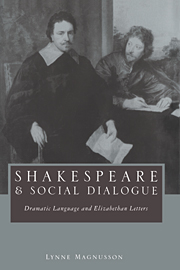Book contents
- Frontmatter
- Contents
- Acknowledgments
- Introduction
- Part 1 THE RHETORIC OF POLITENESS
- Part II ELOQUENT RELATIONS IN LETTERS
- Chapter 3 Scripting social relations in Erasmus and Day
- Chapter 4 Reading courtly and administrative letters
- Chapter 5 Linguistic stratification, merchant discourse, and social change
- Part III A PROSAICS OF CONVERSATION
- Notes
- Bibliography
- Index
Chapter 4 - Reading courtly and administrative letters
Published online by Cambridge University Press: 22 September 2009
- Frontmatter
- Contents
- Acknowledgments
- Introduction
- Part 1 THE RHETORIC OF POLITENESS
- Part II ELOQUENT RELATIONS IN LETTERS
- Chapter 3 Scripting social relations in Erasmus and Day
- Chapter 4 Reading courtly and administrative letters
- Chapter 5 Linguistic stratification, merchant discourse, and social change
- Part III A PROSAICS OF CONVERSATION
- Notes
- Bibliography
- Index
Summary
The field of cultural poetics has alerted scholars of the early modern period to the textuality of documents such as letters that were formerly treated merely as contexts for literature – it has alerted them to these documents' rhetorical performances and the cultural work they do, to the permeability of the boundaries between non-literary genres like the letter and literary genres like tragedy, comedy, or epic. Nonetheless, while individual scholars have produced brilliant textual analyses of particular social documents (including letters), these readings have often been informed more by epideictic ingenuity and a scattershot of reading strategies drawn from formalist habits, deconstructive practices, or figurist rhetoric than by reading practices more appropriate to the genre, that is, practices that can open up the particular eloquence of the Elizabethan courtly letter to rigorous close analysis. An exception is to be found in Frank Whigham's 1981 study, which brings contemporary sociology and historical rhetoric to bear on reading Elizabethan suitors' letters. Whigham regards the virtuosity of courtly letters as motivated by “courtly alienation” and insecurity, by a stress-filled environment where competition for scarce resources and status required competitive self-display and where the shoring up of a hierarchical social world required “repeatable assertions of relation.”
- Type
- Chapter
- Information
- Shakespeare and Social DialogueDramatic Language and Elizabethan Letters, pp. 91 - 113Publisher: Cambridge University PressPrint publication year: 1999



